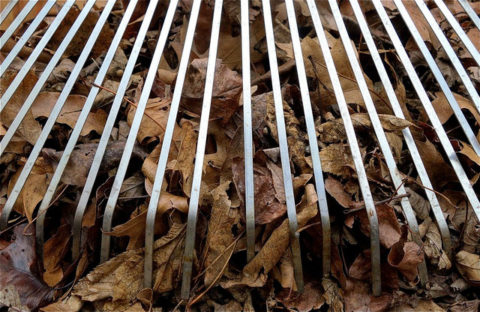
It’s time to rake leaves off your lawn and clean up your garden. Dean Hochman photo.
October is a great time to clean up your garden and landscape. You can take a number of steps now that will help make your plants healthier and your yard easier to care for next year.
Garden cleanup 1: Leaves on your lawn
Leaves, especially wet leaves, can thin your lawn in a very short time. Fallen leaves smother the grass. This prevents water from evaporating and eliminates air exchange. The combination of wet plants and low oxygen can cause fungus, mold and disease. It essentially rots your lawn.
Rake or blow leaves off your lawn at least once a week during peak leaf fall. Dry leaves are easier to rake than wet ones, so aim for a dry day if possible. A good rake makes the job easier.
Leaves make a great mulch for your garden beds. Just rake them onto the beds and spread them out in a thick layer. Make sure to leave a ring that’s several inches wide around the trunks of your trees and shrubs.
You could also add leaves to your compost pile. Composted leaves make great soil amendments.
If you have fruit trees, ornamental cherries, ornamental plums and dogwoods, do not compost these leaves. These trees are prone to diseases and the leaves may be infected. Put them in yard waste bins for pickup.
Garden cleanup 2: Under your trees and shrubs
Remove fallen fruit and any fruit remaining on the tree. This will keep insects from overwintering and causing problems next spring. Dispose of fruit.
Rake and remove leaves from under your rose bushes and other trees or shrubs prone to disease. Pick off diseased leaves. Removing leaves will help reduce fungal diseases, like black spot and powdery mildew, next year.
Keep the stems or trunks of trees and shrubs free of piled mulch, weeds or other competing plants. Keep weeds and grass cut short under the tree canopy.
Garden cleanup 3: Some (but not all) plant debris
Once the harvest is over, remove corn stalks and other plants from your vegetable garden. Make sure to remove tomato plants to reduce late blight problems. Remove dead plants elsewhere in the yard.
But don’t go overboard with garden cleanup. Dead plant stems, dried seed pods and faded ornamental grasses provide homes for pollinators and other beneficial insects such as native bees, spiders, ladybugs and beetles. These insects may also rely on logs, brush piles or dead ground cover to winter in. Birds may eat seeds and insects. Local, native plants are especially important to keep, as they are most likely to provide food for local wildlife.
The winter garden also provides more visual interest if it hasn’t been cut to the ground. Dead stems lend height, and some seed pods have a sculptural quality.
Garden cleanup 4: Weeds
Pull weeds that have sprouted in your garden beds. Weeds left in the garden will go to seed, producing hundreds of new weeds next year.
References
How to rake leaves (almost effortlessly), Chicago Tribune.
The Gardener’s Guide to Plant Diseases. by Barbara Pleasant.
Arboriculture: Integrated Management of Landscape Trees, Shrubs, and Vines. Harris, R. W. Prentice Hall, Inc. New Jersey. 1992.
Garden Clean-up and other October Gardening Tips, University of Vermont Extension.
9 Things You Should Be Doing To Clean Your Fall Garden In Preparation For Winter, Rodale’s Organic Life.
